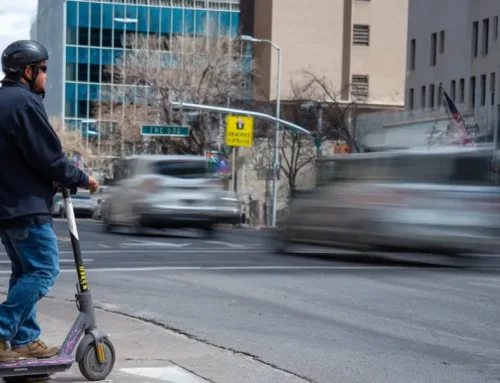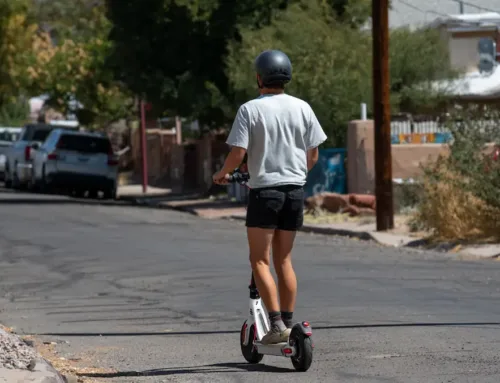If you carry Medical Payments (MedPay) coverage on your personal auto insurance policy, you’re likely covered—even when you’re a passenger in a rideshare accident. Here’s what every New Mexico rideshare passenger needs to know about this potentially lifesaving coverage:
MedPay Follows You, Not Your Car
One of the most misunderstood aspects of MedPay is how it works when you’re not driving your own vehicle. The good news? In New Mexico, MedPay coverage follows you as a person, not your car. This means your MedPay will cover your medical expenses from a car accident whether you’re:
- Driving your own vehicle
- Riding as a passenger in any vehicle (including rideshares)
- Walking as a pedestrian when struck by a car
- Cycling when hit by a motor vehicle
Think of MedPay as your personal medical safety net that travels with you wherever you go. When you’re injured in that Uber or Lyft accident, your own insurance policy can step up to help immediately.
Why MedPay Matters for Rideshare Passengers
New Mexico operates under a fault-based insurance system, which means the at-fault driver’s insurance will eventually pay for your injuries. But here’s the problem: determining fault and getting compensation can take months or even years.
Meanwhile, your medical bills won’t wait.
Let’s say you suffer injuries in a rideshare crash that requires emergency room treatment, X-rays, and follow-up care totaling $8,000. Without MedPay, you might find yourself in a frustrating situation:
- The rideshare company’s $1 million liability policy won’t pay until fault is established
- The other driver’s insurance company is disputing who caused the accident
- Your health insurance has high deductibles and co-pays
- Medical providers are demanding payment while lawyers sort things out
With MedPay, you file a claim with your own insurance company, and they pay your medical expenses up to your coverage limit—typically within days, not months. No deductible, no co-pays, and no waiting for fault determination.

How MedPay Works in Real Rideshare Scenarios
Consider Maria’s experience: She was riding in a Lyft when another driver made an illegal left turn, causing a serious collision. Maria suffered a concussion and needed immediate emergency treatment. Because Maria carried $10,000 in MedPay coverage on her personal auto policy, her insurance company immediately paid:
- $2,500 for emergency room treatment
- $800 for ambulance transport
- $1,200 for follow-up neurological exams
- $600 for prescribed medications
Total immediate coverage: $5,100, with no out-of-pocket expense to Maria.
While car accident lawyers worked to determine fault and pursue additional compensation from the at-fault driver’s insurance, Maria received the medical care she needed without financial stress. Her MedPay didn’t affect her premiums since she wasn’t at fault for the accident.
The Financial Reality of Rideshare Accidents
Medical costs from car accidents can escalate quickly. A simple emergency room visit might cost $3,000-$5,000, while more serious injuries requiring surgery or extended treatment can reach tens of thousands of dollars.
Without immediate coverage, you face impossible choices:
- Delay necessary medical treatment
- Go into debt to pay medical bills
- Accept reduced settlements to get quick cash
MedPay eliminates these impossible choices by providing immediate access to medical care funding.
What New Mexico Law Requires (And What It Doesn’t)
While New Mexico requires rideshare companies to carry substantial liability insurance—at least $1 million when a ride is in progress—this coverage only applies after fault is determined. The state doesn’t require rideshare drivers to carry MedPay coverage, leaving a potential gap in immediate medical expense coverage.
Your personal MedPay coverage fills this gap perfectly.
New Mexico insurers must offer MedPay coverage of at least $5,000 on new auto policies unless you specifically decline it. Many people don’t realize they already have this coverage, while others decline it without fully understanding its benefits.

MedPay vs. Health Insurance: Why Both Matter
You might wonder: “Why do I need MedPay if I have health insurance?” Here’s the difference:
Health Insurance:
- Often requires deductibles ($1,000-$5,000+)
- Includes co-pays for treatment
- May limit provider choices
- Can take time to authorize treatments
MedPay:
- No deductible or co-pays
- Covers any licensed medical provider
- Pays immediately upon claim filing
- Works alongside your health insurance
Think of MedPay as filling the gaps that health insurance leaves behind, especially in those critical first days after an accident when every dollar counts.
Will Your MedPay Cover You If You’re Hurt in a Rideshare?
Picture this: you’re heading home after a late dinner, relaxing in the back seat of an Uber, when suddenly another driver runs a red light and slams into your vehicle. In that terrifying moment, the last thing on your mind is insurance coverage. But once the dust settles and the medical bills start piling up, you’ll be grateful you took the time to learn about your protection options.
If you carry Medical Payments (MedPay) coverage on your personal auto insurance policy, you’re likely covered—even when you’re a passenger in someone else’s vehicle. Here’s what every New Mexico rideshare passenger needs to know about this potentially lifesaving coverage.
MedPay Follows You, Not Your Car
One of the most misunderstood aspects of MedPay is how it works when you’re not driving your own vehicle. The good news? In New Mexico, MedPay coverage follows you as a person, not your car.
This means your MedPay will cover your medical expenses from a car accident whether you’re:
- Driving your own vehicle
- Riding as a passenger in any vehicle (including rideshares)
- Walking as a pedestrian when struck by a car
- Cycling when hit by a motor vehicle
Think of MedPay as your personal medical safety net that travels with you wherever you go. When you’re injured in that Uber or Lyft accident, your own insurance policy can step up to help immediately.
Why MedPay Matters for Rideshare Passengers
New Mexico operates under a fault-based insurance system, which means the at-fault driver’s insurance will eventually pay for your injuries. But here’s the problem: determining fault and getting compensation can take months or even years.
Meanwhile, your medical bills won’t wait.
Let’s say you suffer injuries in a rideshare crash that requires emergency room treatment, X-rays, and follow-up care totaling $8,000. Without MedPay, you might find yourself in a frustrating situation:
- The rideshare company’s $1 million liability policy won’t pay until fault is established
- The other driver’s insurance company is disputing who caused the accident
- Your health insurance has high deductibles and co-pays
- Medical providers are demanding payment while lawyers sort things out
With MedPay, you file a claim with your own insurance company, and they pay your medical expenses up to your coverage limit—typically within days, not months. No deductible, no co-pays, and no waiting for fault determination.
How MedPay Works in Real Rideshare Scenarios
Consider Maria’s experience: She was riding in a Lyft when another driver made an illegal left turn, causing a serious collision. Maria suffered a concussion and needed immediate emergency treatment.
Because Maria carried $10,000 in MedPay coverage on her personal auto policy, her insurance company immediately paid:
- $2,500 for emergency room treatment
- $800 for ambulance transport
- $1,200 for follow-up neurological exams
- $600 for prescribed medications
Total immediate coverage: $5,100, with no out-of-pocket expense to Maria.
While lawyers worked to determine fault and pursue additional compensation from the at-fault driver’s insurance, Maria received the medical care she needed without financial stress. Her MedPay didn’t affect her premiums since she wasn’t at fault for the accident.

The Financial Reality of Rideshare Accidents
Medical costs from car accidents can escalate quickly. A simple emergency room visit might cost $3,000-$5,000, while more serious injuries requiring surgery or extended treatment can reach tens of thousands of dollars.
Without immediate coverage, you face impossible choices:
- Delay necessary medical treatment
- Go into debt to pay medical bills
- Accept reduced settlements to get quick cash
MedPay eliminates these impossible choices by providing immediate access to medical care funding.
What New Mexico Law Requires (And What It Doesn’t)
While New Mexico requires rideshare companies to carry substantial liability insurance—at least $1 million when a ride is in progress—this coverage only applies after fault is determined. The state doesn’t require rideshare drivers to carry MedPay coverage, leaving a potential gap in immediate medical expense coverage.
Your personal MedPay coverage fills this gap perfectly.
New Mexico insurers must offer MedPay coverage of at least $5,000 on new auto policies unless you specifically decline it. Many people don’t realize they already have this coverage, while others decline it without fully understanding its benefits.
MedPay vs. Health Insurance: Why Both Matter
You might wonder: “Why do I need MedPay if I have health insurance?” Here’s the difference:
Health Insurance:
- Often requires deductibles ($1,000-$5,000+)
- Includes co-pays for treatment
- May limit provider choices
- Can take time to authorize treatments
MedPay:
- No deductible or co-pays
- Covers any licensed medical provider
- Pays immediately upon claim filing
- Works alongside your health insurance
Think of MedPay as filling the gaps that health insurance leaves behind, especially in those critical first days after an accident when every dollar counts.
Protecting Your Family’s Financial Future
If you frequently use rideshares—whether for work commutes, nights out, or airport trips—MedPay coverage becomes even more valuable. The cost is typically minimal, often under $10 per month for $5,000-$10,000 in coverage, but the peace of mind is immeasurable.
You should seriously consider increasing your MedPay coverage limits if you regularly use rideshare services or have family members who frequently ride in other vehicles. Residents living in high-traffic areas face increased accident risks, making higher coverage limits even more important. Additionally, if your health insurance carries high deductibles, MedPay becomes your financial lifeline during those expensive first days of medical treatment.
The math is simple: paying an extra few dollars per month for enhanced MedPay coverage can save you thousands when an accident occurs.
When Things Get Complicated: Beyond MedPay
While MedPay provides essential immediate coverage, it’s just one piece of your protection puzzle. Serious rideshare accidents can involve complex insurance situations with multiple parties, each with their own coverage and potential responsibilities.
Consider what happens when a rideshare accident involves the rideshare company’s insurance, the rideshare driver’s personal insurance, other drivers’ insurance policies, and your own uninsured or underinsured motorist coverage. Each insurance company has financial incentives to minimize their responsibility, often leaving injured passengers caught in the middle of competing claims and finger-pointing between insurers.
This is precisely when having experienced legal representation becomes essential. Insurance adjusters are trained to settle claims for as little as possible, and they know most people don’t fully understand their rights or the true value of their claims.
Don’t Wait for an Emergency to Learn About Your Coverage
Take a moment right now to review your auto insurance policy. Look for “Medical Payments” or “MedPay” coverage. If you don’t have it, or if your limits seem too low, contact your insurance agent to discuss your options. The small additional premium could save you thousands of dollars and enormous stress if you’re ever injured in a rideshare accident.
If you want an unbiased examination of your insurance coverage, call Roadrunner Law Firm and a real lawyer will look over your policy and advise you on what coverage you really have, and what might be missing.
When You Need More Than Insurance
If you’ve been injured in a rideshare accident, dealing with multiple insurance companies while trying to recover from your injuries can be overwhelming. Insurance adjusters may pressure you to settle quickly for less than you deserve, or they might deny valid claims entirely.
At Roadrunner Law Firm, we handle the insurance battles while you focus on healing. We work to maximize all available coverage sources—including your MedPay benefits—and ensure you receive full compensation for your injuries.
Don’t let insurance companies take advantage of your situation. Call Roadrunner Law Firm Today.
Get the Help You Deserve
Rideshare accidents involve complex insurance coverage issues that most people never expect to face. If you’ve been injured as a passenger in an Uber or Lyft, you need experienced legal guidance to protect your rights and maximize your recovery.
Contact Roadrunner Law Firm today at 505-444-4321 for your free consultation. We’ll review your case, explain all available coverage options, and fight to get you the compensation you deserve.
Remember: Your MedPay coverage is there to help you immediately, but don’t let insurance companies convince you that’s all you’re entitled to. Serious injuries deserve serious compensation, and we’re here to make sure you get it.
The information in this article is for educational purposes only and does not constitute legal advice. Every accident case is unique, and insurance coverage can vary significantly between policies. For specific guidance about your situation, consult with a qualified personal injury attorney.



